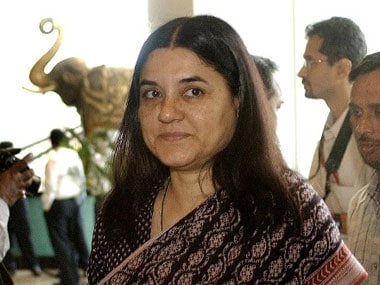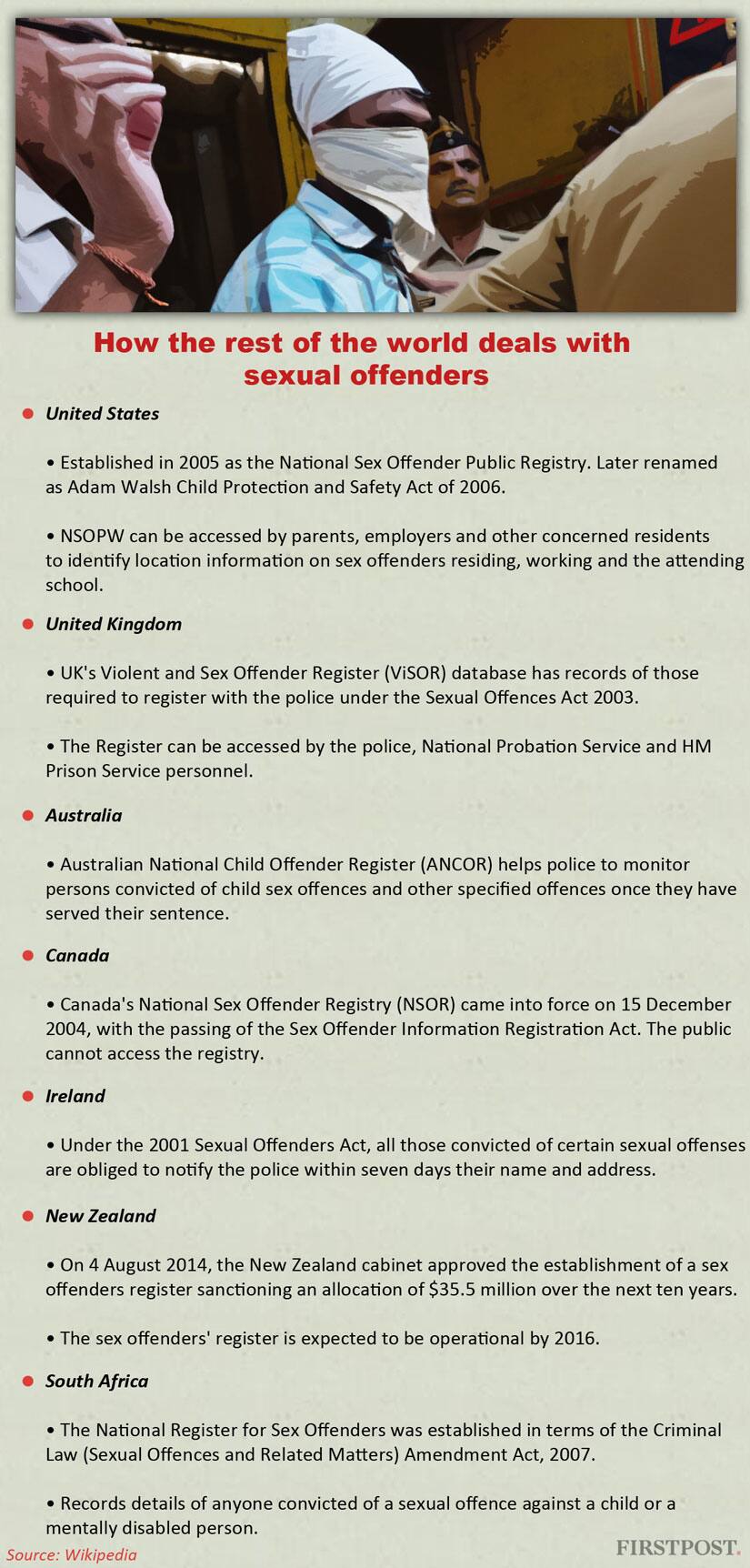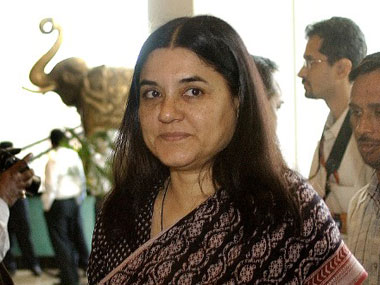Women and Child Welfare Minister Maneka Gandhi is deeply disturbed over the prospect of the release of the juvenile involved in the Delhi gangrape case this weekend. While she understands that in this case law has been complied with, which is distinct from delivery of justice, her ire is against a broadly dysfunctional Rajya Sabha where the bill is pending since May 2015. She has already met Home Minister Rajnath Singh and Law Minister Sadananda Gowda and explained to them her concern over the issue. She has also conveyed to them the possible measures the government must take till such time the amended Juvenile Justice Bill is passed and enacted as the law of the land. [caption id=“attachment_2548188” align=“alignleft” width=“380”]
 Women and Child Welfare Minister Maneka Gandhi. AFP[/caption] In a freewheeling talk with Firstpost, she says, “Rajya Sabha’s refusal to pass this bill and other legislations is like committing a crime. Thousands of so called criminals will be let loose (the proposed amendments in Juvenile Justice as passed by Lok Sabha on May 7, 2015 permits juveniles between the ages of 16-18 years to be tried as adults for heinous offences like murder and rape). There is a group in Rajya Sabha which says children (below 18) should be children but at the same time the same people say that sexual violence and crime against women must stop.” Eleven opposition Rajya Sabha members — Shantaram Naik, Parvez Hashmi, Wansuk Syiem, Vijyalakshmi Sadho, D Raja, Naresh Agrawal, Jharna Das Baidya, KC Tyagi, KP Ramalingam, DP Tripahi and Viplove Thakur — had moved a “motion for reference of the bill to Select Committee” on 7 December. There is a feeling among senior officials who laboured hard to prepare the bill that if the Bill is sent to the Select Committee it would mean endless delay, even the death of the amendments introduced. All the signatories to the motion are opposed to the change that those aged between 16 and 18 should be tried as adults if they commit a heinous crime. The bill originally introduced in Parliament in August 2014 was passed by Lok Sabha in the Budget session this year and was moved in Rajya Sabha for discussion and passage. But it is pending there since then. “This is listed in every session and is not taken up. I am fed up with this. This is not a political issue, neither is this Maneka Bill. Bills are not synonyms of a minister.” “Since we have a weak law, the rapist (the juvenile in Nirbhaya case) can be released,” Maneka says, agreeing with Nirbhaya’s father who had said that the manner in which the juvenile is to be released, with job prospects and cash in hand, is like incentivising juvenile crimes. Badaun, the place where he belongs, is even otherwise violence prone. On media reports that Intelligence Bureau has sent a report that this juvenile was indoctrinated by a Kashmiri terrorist and should thus be kept in detention for a longer period, Maneka raises a bigger issue: “I am asking what was a terrorist doing there (children’s home)? Why do you keep someone who commits Rajdroh, a terrorist, in such homes? That’s because the new law is not passed.” There are inputs from law enforcing agencies that terrorist groups are providing the young recruits with birth certificates to place them in the age group 16-17. The home ministry is aware of it. Maneka has also raised the issue with the home minister. People tend to forget that the most juveniles commit heinous crimes on children, Maneka says, marshalling out whole lot of statistics. She narrates crime committed at various places in the country and then poses a question: “Who do we take care of, the victim’s or that of the juvenile who committed crime?” The juvenile who is sent to children’s home for a maximum period of three years is for rehabilitation and care. Who do I treat - a seven-year old rape victim or a 16-year old rapist?” Besides that in her conversation with Singh and Gowda, she has flagged off two other connected issues: first, once released there is no surveillance of the convicts, either by the children’s home or by the adult jail. She has suggested that a register for offenders of sexual violence be maintained. It would record where they go and what they do among other matters. Second, there is no sharing of information by the police with their counterparts in other states. A man murders his fourth wife, comes to Delhi and marries a fifth woman. There was a need to maintain that record and share with other law enforcing agencies. Maneka is not very hopeful that the juvenile in Nirbhaya case would be kept in detention beyond this week. “After all how do you detain him on basis of suspicion?” she says. Firstpost conducted a poll on Twitter, asking people whether the juvenile convict should walk free or face extended imprisonment.
Women and Child Welfare Minister Maneka Gandhi. AFP[/caption] In a freewheeling talk with Firstpost, she says, “Rajya Sabha’s refusal to pass this bill and other legislations is like committing a crime. Thousands of so called criminals will be let loose (the proposed amendments in Juvenile Justice as passed by Lok Sabha on May 7, 2015 permits juveniles between the ages of 16-18 years to be tried as adults for heinous offences like murder and rape). There is a group in Rajya Sabha which says children (below 18) should be children but at the same time the same people say that sexual violence and crime against women must stop.” Eleven opposition Rajya Sabha members — Shantaram Naik, Parvez Hashmi, Wansuk Syiem, Vijyalakshmi Sadho, D Raja, Naresh Agrawal, Jharna Das Baidya, KC Tyagi, KP Ramalingam, DP Tripahi and Viplove Thakur — had moved a “motion for reference of the bill to Select Committee” on 7 December. There is a feeling among senior officials who laboured hard to prepare the bill that if the Bill is sent to the Select Committee it would mean endless delay, even the death of the amendments introduced. All the signatories to the motion are opposed to the change that those aged between 16 and 18 should be tried as adults if they commit a heinous crime. The bill originally introduced in Parliament in August 2014 was passed by Lok Sabha in the Budget session this year and was moved in Rajya Sabha for discussion and passage. But it is pending there since then. “This is listed in every session and is not taken up. I am fed up with this. This is not a political issue, neither is this Maneka Bill. Bills are not synonyms of a minister.” “Since we have a weak law, the rapist (the juvenile in Nirbhaya case) can be released,” Maneka says, agreeing with Nirbhaya’s father who had said that the manner in which the juvenile is to be released, with job prospects and cash in hand, is like incentivising juvenile crimes. Badaun, the place where he belongs, is even otherwise violence prone. On media reports that Intelligence Bureau has sent a report that this juvenile was indoctrinated by a Kashmiri terrorist and should thus be kept in detention for a longer period, Maneka raises a bigger issue: “I am asking what was a terrorist doing there (children’s home)? Why do you keep someone who commits Rajdroh, a terrorist, in such homes? That’s because the new law is not passed.” There are inputs from law enforcing agencies that terrorist groups are providing the young recruits with birth certificates to place them in the age group 16-17. The home ministry is aware of it. Maneka has also raised the issue with the home minister. People tend to forget that the most juveniles commit heinous crimes on children, Maneka says, marshalling out whole lot of statistics. She narrates crime committed at various places in the country and then poses a question: “Who do we take care of, the victim’s or that of the juvenile who committed crime?” The juvenile who is sent to children’s home for a maximum period of three years is for rehabilitation and care. Who do I treat - a seven-year old rape victim or a 16-year old rapist?” Besides that in her conversation with Singh and Gowda, she has flagged off two other connected issues: first, once released there is no surveillance of the convicts, either by the children’s home or by the adult jail. She has suggested that a register for offenders of sexual violence be maintained. It would record where they go and what they do among other matters. Second, there is no sharing of information by the police with their counterparts in other states. A man murders his fourth wife, comes to Delhi and marries a fifth woman. There was a need to maintain that record and share with other law enforcing agencies. Maneka is not very hopeful that the juvenile in Nirbhaya case would be kept in detention beyond this week. “After all how do you detain him on basis of suspicion?” she says. Firstpost conducted a poll on Twitter, asking people whether the juvenile convict should walk free or face extended imprisonment.
 (This article was originally published on 16 December.)
(This article was originally published on 16 December.)
)